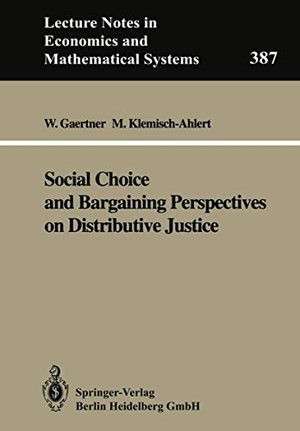Für statistische Zwecke und um bestmögliche Funktionalität zu bieten, speichert diese Website Cookies auf Ihrem Gerät. Das Speichern von Cookies kann in den Browser-Einstellungen deaktiviert werden. Wenn Sie die Website weiter nutzen, stimmen Sie der Verwendung von Cookies zu.
Cookie akzeptieren
Marlies Klemisch-Ahlert / Wulf Gaertner
Social Choice and Bargaining Perspectives on Distributive Justice
- Springer Berlin Heidelberg
- 1992
- Taschenbuch
- 148 Seiten
- ISBN 9783540558156
It is probably fair to say that there does not exist a unique and generally accepted not ion of justice. Even if one confines oneself to economic justice one can still get many answers to the question of how justice - henceforth we shall use the term "distributive justice" should be defined and characterized. This may be disappointing for the outside observer but one can also view this as achallenge, at least as long as one thinks that distributive justice is an issue economics should be concerned with. Many problems of distributive justice can be described as follows: There is a fixed collection of well-defined objects
Mehr
Weniger
zzgl. Versand
in Kürze